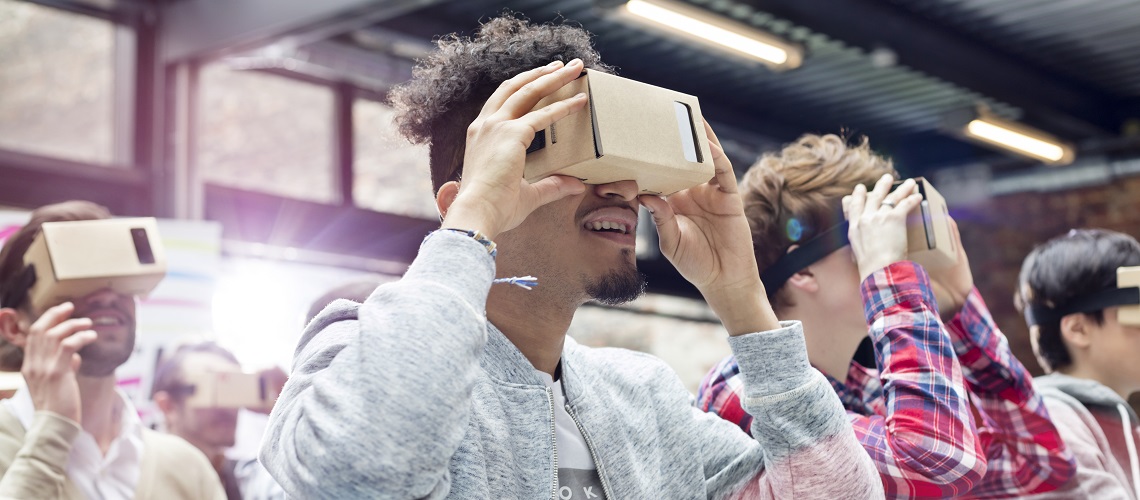Virtual Reality(VR) and Augmented Reality(AR): What’s the Difference?
Virtual Reality (VR) is basically a technology in which you can feel and interact with a virtual world created by a phone, computer or some other device. It makes you feel as if they have been transported from their real world to a virtual world. In fact, top of the line VR devices provides users with a very realistic sensation. They can feel and interact with the environment in the world of virtual reality. However, to experience VR, you need a VR helmet or devices like Oculus Rift or Samsung Gear VR.
Augmented Reality (AR) is different from VR in the sense that AR does not transport you to a Virtual World but lets you interact with the virtual world by bringing it into the real world. This lets one interact with the virtual stuff in their own environment.
Let’s take an example to show you the difference;
Pokemon Go: I am sure you must have played this game or are still playing this game. Pokemon Go by Niantic created a hype among smartphone users all over the world by using a simple technology; the Augmented Reality Technology.
Is AR Gaming the Next Big Thing: Will AR replace VR in Gaming?
However, with Apple’s CEO Tim Cook stating that AR and not VR is the future, I thought whether the same would be the case in gaming. So I asked several tech experts what they think and here’s what they had to say.
Here’s what Shaun from HERO|farm said
AR is definitely the next big thing, but the technology isn’t quite there yet. As evidence, the much anticipated Microsoft Hololens is still years away but its application looks incredible. However, I do not foresee AR completely replacing VR. This is the fact that VR creates NEW worlds, while AR only augments our real one. Both provide exciting possibilities and each offers their own unique elements/advantages. It just depends on what the user seeks.
AR will be better in the sense that it will enable us to interact and see our current environment in new and unexpected ways while VR will bring us to brand new ones that we may never experience in our lifetimes.
Joanan from Mollejuo said
AR is going to be bigger than VR for the simplest reason that AR requires (at its core) just a smartphone, because of this the market that can be reached in AR is bigger than VR. While certainly, VR gear will be cheaper in the near future, still AR has an edge. In any case, both user experiences (AR & VR) will happily coexist for a long time, given that those are two different use-case scenarios.
I sort of agree with Mollejuo. In fact, I recently published a post on the best AR apps that one must-have and after some intense research, I inadvertently found that AR apps are much more in number than that of its VR counterpart.
If you think that’s all, you are very wrong.
Eric from Saugus.net shows a very interesting view as to which technology appeal to which games and feels that both the technology will remain present side by side in gaming.
Here’s what he had to say;
Don’t be confused by the similarity of names — they’re two different things, with different strengths & weaknesses and different (although probably overlapping) audiences. AR (as its name suggests) *augments* reality by adding game elements to it. VR *replaces* reality with its own alternative one. Various games that leverage the real world lend themselves well to AR. Games that need fantasy or sci-fi environments lend themselves better to VR.
Chris from Wowza.com represents an interesting and detailed view on this debate too;
Unlike other passing tech fads that have fallen to the wayside, VR has a utility that extends beyond gimmicky entertainment tricks. Games and immersive experiences are pulling us deeper into virtual entertainment, similar to Ernest Cline’s OASIS in Ready Player One. Only now instead of the virtual revolution starting with a gaming console or dedicated VR system, it’s beginning with your smartphone.
Consider Pokémon Go, the mobile augmented reality game with over 7.5 million downloads. The game turns your phone into a conduit that uses cameras and GPS to let you engage in a virtual world within real-life surroundings. This is called Augmented Reality, or AR, where you’re overlaying virtual content on top of the real world view. However, AR is just the first step into full VR immersion.
VR has always been about immersion into completely artificial worlds and interaction with manufactured people, characters, and environments. Just a few short years ago, people laughed at the idea that VR could change the world. Many people expected a Max Headroom type of display where things looked so incredibly fake and distorted that it was hard to imagine real experiences that embraced virtual interactions. But anyone who’s worn an Oculus Rift can tell you that the immersion can be a visually breathtaking experience that delivers 4K, and soon, 8K video.
New applications like Pokémon Go will act like a gateway drug – building our appetite for not only more engaging content, but also new hardware. Before you know it, paying for a VR headset like Oculus Rift, PlayStation VR, or HTC VIVE, or investing in computers to power them, won’t seem so far-fetched for the average consumer.
In order for VR to take off in more than gaming and entertainment, quality content and efficient ways to distribute it need to be addressed. Everything from security, retail, construction, and tourism will benefit from this technology, giving access to thousands – if not millions – of people. Yet these immersive experiences demand pristine content delivery that can affordably scale with audience growth. As such, video quality and low latency will make or break VR’s success.
Antony Vitillo, VR developer and owner of the AR/VR blog The Ghost Howls opines-
About AR and VR gaming, I have the same opinion about every other use of AR and VR. Augmented and virtual reality are technologies that are close to each other, have a lot in common, but they are different and serve two different purposes. As a Medium author has written, AR enhances our world, while VR isolates us from it. Augmented reality is great for experiences where the blending of virtual and real is necessary: in Pokemon Go! for instance, it was awesome running into our towns and catch Pokémons as if they were next to us. Virtual reality is incredible for experiences that make us teleport in another world: for instance an empathic experience like Dear Angelica can have sense only in VR since you feel more connected to the world you’re into; virtual travels are ideal in VR, because in AR I wouldn’t have the immersion of feeling somewhere else.
To explain things easily it is as VR is the evolution of PCs/consoles, while AR is the evolution of smartphones. Smartphone games have not replaced PC ones… there are lots of smartphone games, they’re more pervasive, but they’re a different genre. A First Person Shooter for smartphones isn’t as cool as on a PC. AR will be more pervasive, we will wear it all day long, but there will be times where we’ll want to isolate ourselves from everything and play adventures in another world.
As a closing statement, I could add that I’m firmly convinced that in the far future we’ll wear a glass that will let us experience both AR and VR, so the same device will let us play both types of games.
However, at the end, I would like to put in the quote by Christopher of Giganti.Co, which I seem to somewhat agree on.
“AR and VR are not directly competitive technologies, but they are at different stages in their hype-cycle, and this can cause their visibility to fluctuate as the media darling de jour.
Most consumer facing AR is smartphone based. Even mobile based VR requires a headset. While these may, in broad strokes, both fall under “video games” they are completely different audiences. Take, for example, Candy Crush, one of the top-grossing mobile games of all time, recently acquired by Activision, it has a 70% female user base. VR games, on the other hand, have an 85% male audience. Pokémon Go, last year’s mobile AR hit, and the top grossing mobile game of all time was also predominantly a female user base. Consequently, mobile AR games and VR headset games should be expected to attract vastly different audiences.
Further, by the time AR smart glasses become widely consumer adopted, the AR and VR hardware markets will also begin to converge. At that point, AR vs VR will be reduced to an API call from the same device, and this debate will largely be moot.
Asking if AR will replace VR is like asking if rockets will replace motorcycles. Sure, they’re both mechanically engineered modes of transportation, but they don’t compete for the same travellers.”
Conclusion: Will AR Replace VR in Gaming?
Well, it doesn’t look like that will happen at least in the near future. More chances are that these will coexist and make gaming a more wonderful experience!
What do you think? Let me know down in the comments!
Adhip is the founder of the marketing and entrepreneurship blog WinSavvy. Check out his most adored post on 70 Business Mistakes New Entrepreneurs Make which has been featured on several top-notch blogs. WinSavvy is an organisation which strives to provide world-class consultancy for small businesses in the digital scene and organises marketing campaign as well as helps supervise financial strategies in running the business. While providing corporate legal advisory, Adhip focusses mainly on providing IPR advisory to small businesses around the globe. Services include registration of trademark in India and abroad as well as ensuring a perfect patent application in the US. He is also the business and legal advisor of PatentPC, a website which helps draft patents with the help of AI at 30% of the cost.


























































































































































































